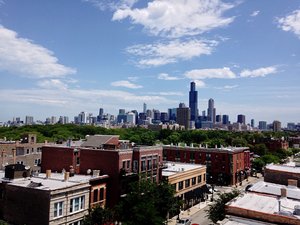Below is an excerpt from The Beat, our daily newsletter on the biggest tech and innovation stories in Chicago. To get this in your inbox every afternoon, sign up here.
Will: Today, four people in Chicago have been arrested in connection to the live-streaming of a video on Facebook that depicts the alleged beating of an individual with mental health issues.
The graphic video shows a group of people torturing and verbally abusing a victim, bound and gagged, while making disparaging remarks about white people and President-elect Donald Trump. The attackers are black; the victim, 18, is white. Chicago police have questioned whether the motive was racial, but late this morning, police said charges would be filed as hate crimes. You can watch the video here (it has been taken down on Facebook).
Karis, this video is in stark contrast with the happy-go-lucky Facebook Live billboards and video advertisements Facebook has recently rolled out as part of a major ad campaign for the tech. So, with Facebook Live in the news (and all around us), we wanted to tackle this emerging tool. Where are you on Facebook Live?
Karis: In current video advertisements (running roughly four times in a 20 minute Hulu TV show episode, see right) Facebook advertises Facebook Live as a platform where you can share your "hidden talents" (juggling, accordion skills, opera voice) or casual opinions in a close-knit setting where your friends will "probably still think you're awesome" even if you fail or say something they don't agree with.
Anyone who's a Facebook user knows this is not exactly how the platform works. Facebook has been used by terrorists to spread propaganda, gangs to spread beheading videos, and fake news sites to get more engagement than the New York Times in the months leading up to the election. And they still thought their users would use the live video platform just to debut their secret hula hooping talent?
I'm not saying that live video is a bad thing--in fact, Facebook Live has brought people into history in real time, from the shooting of Philando Castile in Minnesota to Black Lives Matter marches to the Dakota Access Pipeline protests. The strange compulsion to have an audience for their kidnapping and torture likely led to the quick arrest and charges brought on the four people mentioned above. The pure ubiquity of the platform allows people to intimately bear witness to life in a way we never have before, and that has led to history-altering moments.
Mark Zuckerberg has said that Facebook is not a "traditional media company." But with Facebook Live they're redefining the creators and consumers of media. And sooner or later they're going to have to recognize their platform lives outside the utopia in which they advertise.
Will: To me, Facebook Live is reflective of a dangerous trend with the company (and with a lot of other powerful social networks). It feels like Facebook is blind (or worse, they choose to ignore) the “bad” that can be done with their platform and technology. Obviously, I’m not suggesting that, simply because one person can use a hammer as a weapon we just stop making hammers all together, but it is time that these “disrupters” begin taking accountability for how easily their platforms can be abused.
During your product brainstorm, think about all the “bad” that can be done
This fact - that bad shit WILL happen - needs to built into the infrastructure of the product, or at least considered and addressed from the very beginning. It’s too often that we’re reading stories of social platforms adding features and functionality designed to protect its users from abuse, after the fact. It’s not Twitter’s fault that there are hateful people online. But it is their fault that it took them TEN YEARS to introduce a mute button. (Same with Facebook and fake news. The ability to flag questionable content in the News Feed is something we’re just thinking about?)
Tech needs to wake up to the fact that, simply because they have an idealistic vision of their product/platform, it’s probably, in some cases, doing the complete opposite of what they intended. So, during your product brainstorm, think about all the “bad” that can be done and plan for fail-safes and fire alarms. The world’s too complicated to tell you to stop making guns. But, please, put a freaking safety on there.








